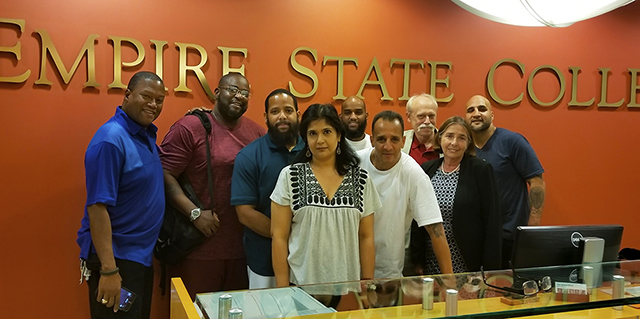"Around the College" is no longer being updated.
View current SUNY Empire Stories.
January 22, 2018
New, Experimental Program Facilitates Entry and Reentry to College for Individuals Previously Involved with the Criminal Justice System
SUNY Empire’s Black Male Initiative Reaches Out to "Returning Citizens"

Returning citizens - individuals with prior involvement with the criminal justice system, now have a new way to enter or reenter higher education, thanks to a new, experimental program developed by SUNY Empire State College faculty and staff in collaboration with the college’s alumni/student club the Black Male Initiative (BMI).
The Returning Citizens Reentry Program takes place once a week for 15 weeks and consists of five, three-part modules. Educational materials used in the program are designed for adult learners.
This noncredit program is designed to provide reentering citizens with college-ready skills in writing, critical reading, public speaking, note taking, basic college-level math and several other academic areas.
The program first launched in the fall of 2017 and begins again for the spring term in early February 2018.
Spring modules include “Integration or Segregation?” led by Professor Lear Matthews and “Managing Your Career for Success,” led by Cory Kallet, a full-time lecturer on the college faculty. Associate Professor Nadine Wedderburn and Barbara Tischler, an adjunct member of the faculty who coached writing in the fall, also will lead modules.
In the first fall module, Associate Professor Dianne Ramdeholl and the returning citizens read “These Mean Streets,” by Piri Thomas, and James Baldwin’s essay, “A Letter to My Nephew.”
“We connected that text to the larger context of that time and also to this current moment," said Ramdeholl. “I experienced the students I worked with as being incredibly motivated with profound and powerful things to say both about the world and their roles in it. They recognize how essential a college education is to becoming true citizens.”
Assistant Professor Debra Kram-Fernandez taught a three-week workshop in the fall on the recovery perspective in mental health and mental illness.
“It was amazing how quickly the three participants warmed up to the idea of open conversation and critical thinking,” said Kram-Fernandez. “The interest and curiosity they demonstrated was laudable. With all that is going on in their lives at this time, the ability to suspend concerns about other aspects of their futures and engage in discussions about social justice in an academic setting was simply impressive.”
Six returning citizens from the New York State Department of Corrections and Community Supervision’s Lincoln Correctional Facility, a minimum security facility housing those in work-release programs located at 31-33 West 110th Street, Manhattan, participated in the fall program.
“Returning and transitioning back into society isn't always the easiest thing to do,” said 34-year-old Qwiheim Marina, one of the program participants from Lincoln. “Coming home brings a new set of responsibilities that have been set before me. I'm in a work-release facility where I'm given a chance to work and my checks are saved in a special account.”
Marina said he had been considering furthering his education when SUNY Empire faculty visited Lincoln and discussed the reentry program with residents. Marina said he kept an open mind, decided to participate and now is much better informed about pursuing higher education.
David A. Fullard, a visiting assistant professor and the faculty advisor to BMI, explained how the program came about. “Ken Radcliffe, a BMI community member and a deacon at the Resurrection Chapel in Harlem, introduced us to Ronald Brereton, the superintendent of Lincoln Correctional Facility. A small workgroup of faculty and staff visited Lincoln. We made a presentation to the superintendent and his program staff, who agreed to participate in the reentry program.”
Faculty and reentering citizens, together with writing coaches Barbara Tischler, an adjunct lecturer with the college, and Associate Professor Steven Tischler, gathered from 6-8 p.m., Friday evenings at 325 Hudson Street, Manhattan, one of the college’s three New York City locations.
"Students in the program are motivated to succeed,” said Barbara Tischler, a published author and the head of school at The Speyer Legacy School in New York City, a private, independent school that serves nearly 300 accelerated learners in grades K-8. She also holds a doctorate in United States History from Columbia University. “They are eager to gain the necessary life skills that will help them to develop the resilience to deal with challenges that will present themselves."
These returning citizens also were eligible to participate in all of the college’s BMI programs.
While BMI was founded, and its programs focus on African-American, black, Caribbean and Latino/ Hispanic men, due to their historic and ongoing underrepresentation in higher education, all BMI programs, services and activities are open and available to the entire SUNY Empire college community.
